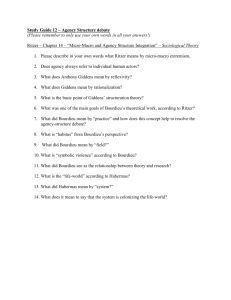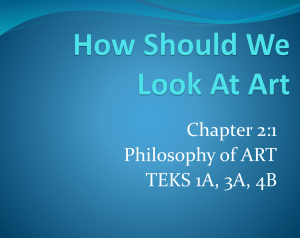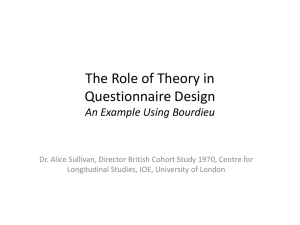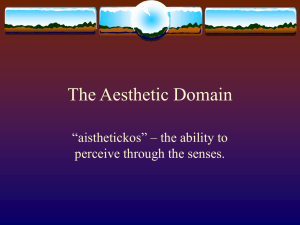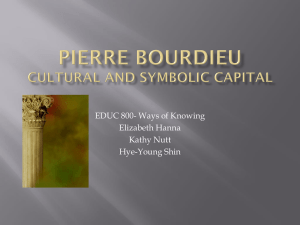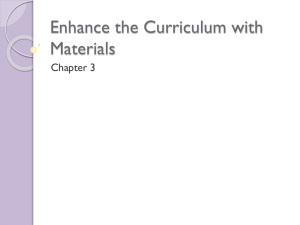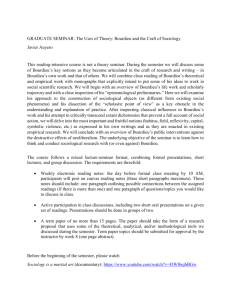Richard Shusterman http://www
advertisement
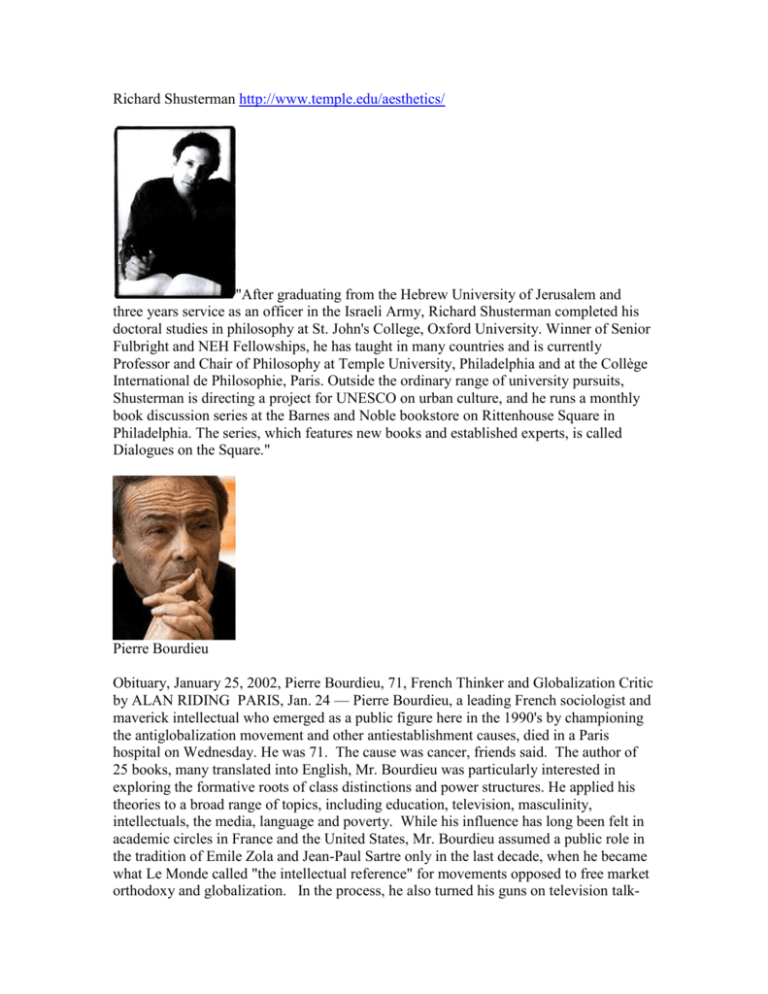
Richard Shusterman http://www.temple.edu/aesthetics/ "After graduating from the Hebrew University of Jerusalem and three years service as an officer in the Israeli Army, Richard Shusterman completed his doctoral studies in philosophy at St. John's College, Oxford University. Winner of Senior Fulbright and NEH Fellowships, he has taught in many countries and is currently Professor and Chair of Philosophy at Temple University, Philadelphia and at the Collège International de Philosophie, Paris. Outside the ordinary range of university pursuits, Shusterman is directing a project for UNESCO on urban culture, and he runs a monthly book discussion series at the Barnes and Noble bookstore on Rittenhouse Square in Philadelphia. The series, which features new books and established experts, is called Dialogues on the Square." Pierre Bourdieu Obituary, January 25, 2002, Pierre Bourdieu, 71, French Thinker and Globalization Critic by ALAN RIDING PARIS, Jan. 24 — Pierre Bourdieu, a leading French sociologist and maverick intellectual who emerged as a public figure here in the 1990's by championing the antiglobalization movement and other antiestablishment causes, died in a Paris hospital on Wednesday. He was 71. The cause was cancer, friends said. The author of 25 books, many translated into English, Mr. Bourdieu was particularly interested in exploring the formative roots of class distinctions and power structures. He applied his theories to a broad range of topics, including education, television, masculinity, intellectuals, the media, language and poverty. While his influence has long been felt in academic circles in France and the United States, Mr. Bourdieu assumed a public role in the tradition of Emile Zola and Jean-Paul Sartre only in the last decade, when he became what Le Monde called "the intellectual reference" for movements opposed to free market orthodoxy and globalization. In the process, he also turned his guns on television talk- show hosts for delivering "cultural fast food" and on many fellow intellectuals whom he accused of abusing their privileged status in France by opining on issues about which they knew little. Counterattacks by intellectuals like Alain Finkelkraut and BernardHenry Levi ensured that he remained in the public eye. Some critics said that he had grown increasingly sectarian in recent years. Yet while he described his political position as "to the left of the left," meaning that he considered the Socialist Party to have sold out, he stood at the heart of France's intellectual establishment. He held the chair of sociology at the College de France, an elite government-backed think tank, he taught at the Ecole des Hautes Etudes en Sciences Sociales and he edited a sociology journal. One measure of his iconoclastic renown in France was that the report of his death was the lead story in Le Monde. Prime Minister Lionel Jospin, himself a Socialist, described Mr. Bourdieu as a master of contemporary sociology and said that "his works made him the leader of a school of thought that applied incisive criticism to the capitalist society." One of Mr. Bourdieu's central theses was that social and cultural breeding were critical to achieving status and power, but his own life's story suggested that, at least for some, France could work as a meritocracy. Born on Aug. 1, 1930, in Denguin in the foothills of the Pyrenees, Mr. Bourdieu had a peasant farmer- turned-postman as a father. Gascon, now a moribund regional dialect, was spoken at home. Young Pierre nonetheless proved a bright student, attending the region's best high school before gaining entrance to the Ecole Normale Superieure in Paris, the traditional cradle of French intellectuals, where he studied philosophy before turning to sociology. Although he graduated at the top of his class, he felt something of an outsider as a poor man surrounded by children of the French elite, and that feeling continued even as he became part of the French intelligentsia. "A lot of what I've done has been in reaction to the Ecole Normale," he said in an interview with The New York Times a year ago. "I think if I hadn't become a sociologist, I would have become very anti-intellectual. I was horrified by that world." Beginning in 1958 he taught for two years at the University of Algiers just as the Algerian war for independence from France was gaining momentum. From this experience emerged his first book, "The Sociology of Algeria." After returning to France to teach in Lille and Paris, he married the former Marie-Claire Brisard in 1962. She and their children, Jerome, Emmanuel and Laurent, survive him. Later, while assuming an ever more prominent role as a sociology teacher, he stepped up the pace of his publications. "Distinction: A Social Critique of the Judgment of Taste," published in France in 1979 and in the United States in 1984, was named one of the 20th century's 10 most important works of sociology by the International Sociological Association. Among his other influential works are "State Nobility: Elite Schools in the Field of Power," "Homo Academicus," "Pascalian Meditations," "On Television" and "The Weight of the World: Social Suffering in Contemporary Societies," which he edited. A soft-spoken man who seemed to enjoy provoking other intellectuals, Mr. Bourdieu had a fatalistic view of the social and economic possibilities available to most people, believing that they entered adulthood with the experiences that would determine their success or failure. "The point of my work is to show that culture and education aren't simply hobbies or minor influences," he told The Times. "They are hugely important in the affirmation of differences between groups and social classes and in the reproduction of those differences." Persuaded that most people in France did not have a fair chance to rise in society, he came to favor the underdog, above all those fighting against perceived injustices wrought by unfettered capitalism. Among those whom he supported was Jose Bove, who gained fame in 1999 by leading small farmers in France on an attack against McDonald's. Today, Mr. Bove was among those remembering Mr. Bourdieu warmly. "For him," Mr. Bove said, "life itself was a commitment." http://netcity5.web.hinet.net/UserData/lukacs/Bourdieu.htm Richard Shusterman "Form and Funk" 1991 1) Popular art vilified as mindless, tasteless trash, both by the left and the right. 2) Shusterman's pragmatism: critical of alienating esotericism and totalizing claims of high art: no unbridgeable divide: the popular art of one culture can become the classics of another later age 3) Popular art provides us (even intellectuals) with too much aesthetic satisfaction to reject it. a) rejecting it divides us intellectuals against the rest of community and against ourselves b) it is an ascetic renunciation in line with intellectuals since Plato 4) Four factors make it difficult to defend it a) we are forced to accept the (hardly neutral) terms of the intellectualist attack b) even defenders of popular art tend to concede its aesthetic poverty c) we tend to think of high art only in terms of the work of genius, while popular art is identified with the mediocre: but popular art is not all tasteless d) the term "aesthetic" is appropriated to the high art, sophisticated style 5) Although Pierre Bourdieu exposes the hidden economy and veiled interests of socalled disinterested aesthetic of high culture, he cannot recognize a legitimate popular aesthetics 6) the term "aesthetic" did originate in intellectual discourse, but now is no longer narrowly confined a) aesthetic terms such as "grace" "elegance" "unity" and "style" are applied to popular art b) surprising that Bourdieu concedes to high culture words like "art" and "aesthetic" 7) will challenge major indictments raised by Bourdieu, focus on funky rock music inspired by African American culture 8) opponents of popular art say that it involves no aesthetic challenge, but requires a passive response: Bourdieu: explains its wide appeal and that it does not satisfy a) Adorno and Horkheimer: pleasure hardens into boredom, and no independent thinking is expected from the audience b) but legitimate activity is not the same as serious thinking: there are other more somatic [body oriented] forms of effort, resistance, and satisfaction i) rock songs involve moving, dancing, singing ii) more effortful appreciation is involved in this than in highbrow music iii) funky: “positive sweat”: “expressive of an African aesthetic of vigorously active and communally impassioned engagement rather than dispassionate judgmental remoteness." iv) passivity underlies "our established appreciation of high art, a passivity expressed in the traditional aesthetic attitude of disinterested, distanced contemplation, which has its roots in the quest for philosophical and theological knowledge rather than pleasure, for individual enlightenment rather than communal interaction or social change." v) Popular arts: aesthetic and joyous return to the somatic [body] dimension which philosophy has long repressed vi) Adorno: popular music is regressive because it is somatic [body oriented] vii) Alan Bloom: rock appeals to sensuality and sexual desire: it is anti-logical viii) two logical blunders (1) THE SENSUOUS APPEAL OF ROCK DOES NOT ENTAIL ANTIINTELLECTUALISM, for the sensuous is not incompatible with intellect (2) ROCK CAN SUSTAIN REFLECTIVE ANALYSIS 9) attack on popular art for lack of formal complexity 10) Bourdieu: the very notion of aesthetic attitude implies a break with the world and ordinary life, yet popular art affirms the continuity between art and life, and so cannot for him be legitimate: the popular aesthetic is essentially opposed to art 11) Shusterman: why should art be opposed to real life? a) this attitude originated in Plato to insure philosophy's sovereignty in determining reality b) art can be seen as part of life, and life constitutes itself artistically in the art of living c) in ancient Athens the arts were intimately integrated into everyday life d) favors Dewey's pragmatist theory of art, which makes the energies needs and pleasures of the live creature central to aesthetic experience 12) Bourdieu: popular art denies its own aesthetic validity by implicitly accepting the domination of the high art aesthetic which denigrates it: so there is no popular art, and popular culture is a paradoxical notion a) Shusterman: this fails as a global argument against popular art: in America this is not true: many popular artists see their role as more than mere entertainment, and the artistic status of their art is frequently recognized, and there is aesthetic criticism of the popular arts (using the same aesthetic predicates one applies to high art) 13) aesthetic message from America is "get down”: vs. “the fastidious conservative taste of contemporary philosophical aesthetics” 1. Shusterman is pretty similar to Brown in his defense of popular music. But in what ways is he different? 2. What two philosophers we have studied in Shusterman most like? 3. Has Shusterman gone over to the other extreme from the people he attacks?
